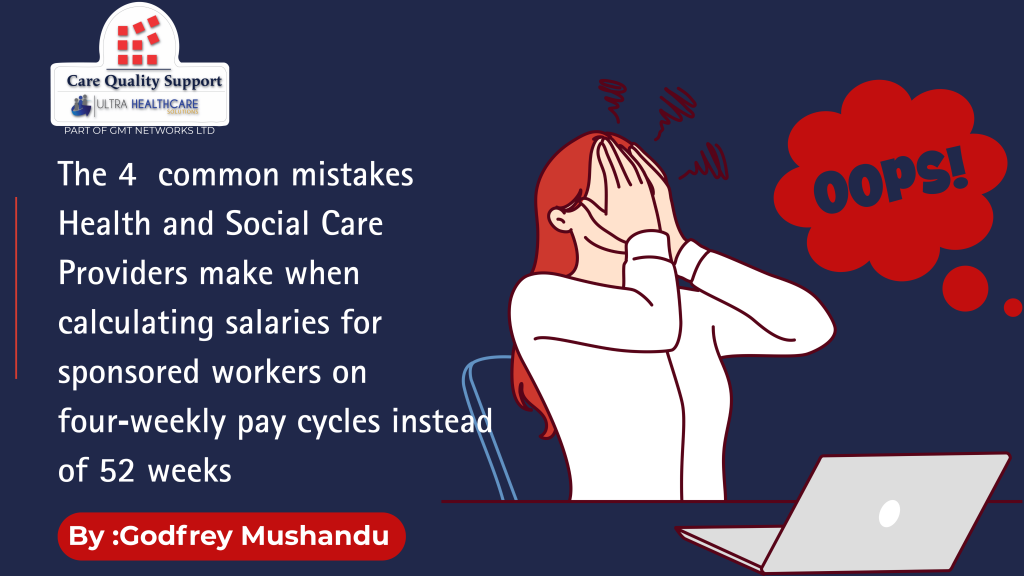Why this (four-weekly-pay-calculation-mistakes)matters
- Home Office salary thresholds must be met – to sponsor a worker under the Skilled Worker route, employers must pay at least the general salary threshold and the occupation’s “going‑rate” . UK Visas and Immigration checks PAYE records and can revoke licences when pay is incorrect.
- Annual salary figures are used – salary thresholds and going‑rates are expressed as gross annual figures, not 4‑weekly or monthly amounts.
- Wrong pay calculations can void a visa – miscalculations could mean the sponsored worker’s salary falls below the required threshold, leading to visa refusal or licence revocation.
Common mistakes with 4‑weekly pay cycles
- Multiplying 4‑weekly pay by 12 – some providers wrongly assume that four‑weekly pay periods equate to 12 months and multiply the pay by 12. However, a year has 52 weeks, which means there are 13 four‑week pay periods. Using 12 underestimates the annual salary and risks underpayment.
- Not using the hourly rate × hours × 52 formula – Home Office guidance assesses salary by multiplying the hourly rate by weekly hours (capped at 48) and then by 52 weeks. For example, a worker doing 60 hours at £15 per hour is treated as earning £37,440 (15×48×52), not £46,800; a part‑time worker doing 20 hours at £20 per hour earns £20,800 (20×20×52).
- Failing to pro rate “going‑rate” salaries – going‑rates are based on a 37.5‑hour week. Employers sometimes forget to adjust the going‑rate for workers who work fewer or more hours, leading to incorrect salary offers.
- Ignoring average hours in irregular patterns – when staff work longer weeks followed by unpaid rest weeks, employers sometimes multiply the high‑hour weeks by 52. Home Office guidance requires averaging hours over a cycle (no more than 17 weeks) and still uses 52 weeks for the annual figure.
How to calculate salaries correctly
- Use the annual formula – multiply the hourly rate by the number of hours per week (capped at 48 for general threshold purposes) and by 52 weeks. For example:
- A worker paid £15/hour for a 40 hour week must earn £31,200 (£15×40×52).
- Care workers paid the Real Living Wage (£12.60/hour) for 37.5 hours must earn at least £24,570 (£12.60×37.5×52).
- Convert 4 weekly pay correctly – multiply the 4 weekly gross pay by 13 to produce the annual salary (because 4×13 = 52). Do not multiply by 12.
- Pro‑rate going‑rates – if the job’s going rate is based on 37.5 hours, adjust it using: going rate × actual weekly hours ÷ 37.5. This ensures part time or long hour roles meet the correct going rate.
- Check overtime limits – for general salary thresholds, Home Office will only count up to 48 hours per week. Extra hours can count toward the going rate but not the general threshold, so ensure base pay still meets the threshold.
Steps providers can take to correct mistakes
- Audit payroll records – review sponsored workers’ payslips, contracts and the Certificate of Sponsorship (CoS) to confirm the hourly rate, weekly hours and annual salary meet current thresholds.
- Recalculate salaries – use the hourly × hours × 52 formula to produce the correct annual salary. Where pay falls short, implement back pay and adjust future pay accordingly to avoid underpayment.
- Update sponsorship records – if salary changes, update the worker’s CoS or assign a new CoS and notify UKVI via the Sponsorship Management System; salary reductions require specific action and may need a new application.
- Train payroll teams – ensure HR/payroll staff understand how to convert four‑weekly pay cycles into annual figures and the difference between general salary thresholds and going‑rates.
- Use written contracts – contracts should show guaranteed basic pay and contracted hours. Avoid inflating salaries with un‑guaranteed allowances; only guaranteed allowances count towards the salary threshold.
- Maintain evidence – keep payslips, timesheets and bank statements for sponsored workers. UKVI may request evidence to confirm salary payments.
- Monitor regulatory updates – salary thresholds change periodically (latest version dated 22 July 2025). Subscribe to Home Office updates and adjust pay promptly when thresholds rise.
Consequences of non‑compliance
- Visa refusal or curtailment – if UKVI finds a worker is paid below the required salary, the worker’s visa can be refused or curtailed.
- Sponsor licence action – underpaying staff or providing false salary information can lead to compliance visits, downgrading or revocation of the sponsor licence.
- CQC/Ofsted implications – underpaying care workers may breach fair pay expectations under CQC fundamental standards. Ofsted‑regulated providers risk negative inspection outcomes if staffing or funding arrangements compromise care quality.
- Employment law risks – paying below the National Minimum Wage or contractual salary may result in HMRC penalties, tribunal claims and reputational harm.
Key take‑away message from four-weekly-pay-calculation-mistakes
- Always base salary calculations on 52 weeks – four‑weekly pay cycles mean 13 pay periods per year. Using 12 underestimates annual pay and risks non‑compliance.
- Check your numbers now – providers sponsoring overseas workers should immediately audit salaries against the latest general thresholds and going‑rates. Correct any shortfalls and update the CoS.
- Get expert help – if you’re unsure about salary calculations or sponsorship compliance, seek advice from a specialist immigration or health‑care consultant. Properly remunerating sponsored staff protects your workforce, your licence and the vulnerable people you serve.
By: Godfrey Mushandu /LinkedIn


















